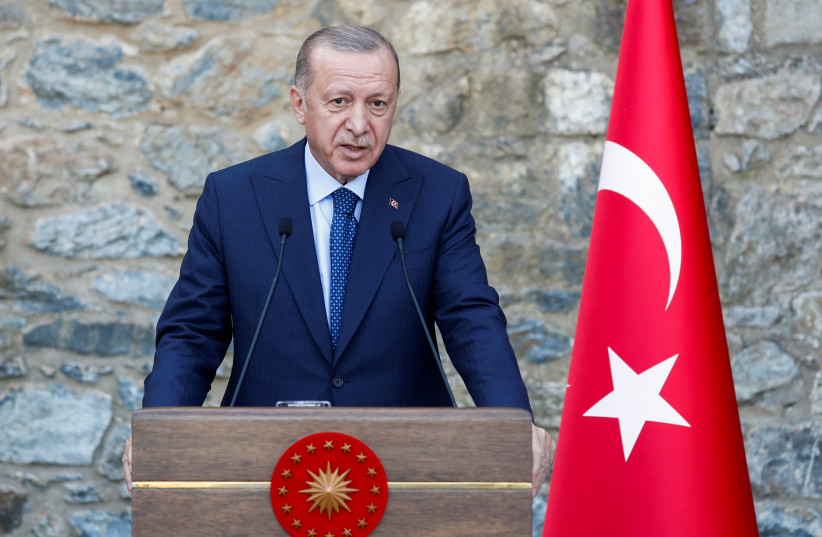Recently the Alliance of Rabbis in Islamic States (ARIS), together with the leadership of the Turkish-Jewish community, met with President Recep Tayyip Erdogan of Turkey at the presidential palace in Ankara.
During the warm reception, which included kosher food and evening Arvit prayers, Erdogan spoke harshly against antisemitism, and we discussed Jewish life around Turkey, North Cyprus and the Muslim world.
At our meeting, Erdogan also spoke about the renewed contacts and phone conversations he had with President Isaac Herzog and Prime Minister Naftali Bennett, and the hopes of enhancing relations between Turkey and Israel.
All the while, there is increasing chatter about an upcoming visit to Turkey by Herzog – which for me as a rabbi, is certainly good news – as Turkey, where Jews have lived for 2,600 years, extends a hand of increased friendship toward a country that is home to so many of my fellow Jews.
But it shouldn’t end there. Bilateral relations, should not be solely limited or dependent on relationships between elected governments or diplomats. It should permeate every level of society.

Synagogues and mosques, imams and rabbis, Jews and Muslims should work together, coordinating joint projects to preserve the heritage we both hold dear, and bringing aid and assistance to those in need.
And most importantly, we must work together to recognize the humanity of all peoples, regardless of faith. These values – and many others – are common to our two faiths, and we can and should work together to promote them without diluting one’s own beliefs.
Normalization means to recognize that we have deep, underlying differences – and these differences make us unique – but that we also have much in common. We share deeply held values, and we should work together to promote those.
It’s highly encouraging to see so many already existing expressions of our shared values of mutual respect, tolerance and kindness express themselves across the Muslim world – especially in those countries who signed on the Abraham Accords. The UAE has especially been very active in taking the normalization process beyond diplomatic relations, as Federal National Council adviser Ali Al Nuaimi recently wrote in The Jerusalem Post, “We all have a role to play, however big or small, in our families, communities, schools, sports organizations, mosques and workplaces.”
Normalization can look like the work of the Foundation for Ethnic Understanding, led by Rabbi Marc Schneier, whose book Sons of Abraham, which he co-authored with Imam Shamsi Ali, has recently been translated to several languages.
Normalization can look like the work of Sharaka, which brings together delegations of people of all faiths to and from the Gulf countries to get to know Israel and the Jewish people, building personal ties and encouraging diverse forms of cooperation.
One of the main aspects of normalization is to know what makes a people who they are. The Holocaust is one of the defining events in Jewish history – and understanding the Holocaust means understanding Jews. The leader of the Muslim World League, Muhammad bin Abdul Karim Issa, while visiting Auschwitz with the American Jewish Committee, went even a step further, saying the “unconscionable crimes to which we bear witness today are truly crimes against humanity. That is to say, a violation of us all, an affront to all of God’s children.”
In the UAE, a Holocaust memorial exhibition opened in the summer in the Crossroads of Civilizations Museum – and the opening was attended by the Israeli and German ambassadors to the UAE. International Holocaust Remembrance Day, which is observed in Turkey since 2008, was marked in Egypt, Morocco, Indonesia, Bahrain and the UAE – among other countries – with the participation of government ministers and ministries.
The planned visit of Herzog should be more than just a diplomatic breakthrough – it should be a catalyst for understanding, for cooperation, for appreciation of people. All those involved should invest time and efforts to really understand each other and to express it, this is the only way to curb rising antisemitism and Islamophobia.
Building on the long history of coexistence of Jewish communities across the Muslim world, without negating the more painful parts of our mutual history, normalization focuses on what we share; what we hold in common.
But that doesn’t mean we are the same. I believe that true normalization of Jewish-Muslim relationships does not dilute or compromise either faith. On the contrary: it’s an expression of faith in the deeply held values we share to say that we should be working together to promote them.
As leaders in our respective communities, rabbis, imams, priests and all clergy people should recognize that by promoting universal values of charity, kindness and decency to one another, we make our own communities stronger and more secure even as we bring aid and comfort to those most in need.
The writer serves as the Ashkenazi rabbi of Turkey and chair of the Alliance of Rabbis in Islamic States, follow us on Twitter @RabbisAlliance.
